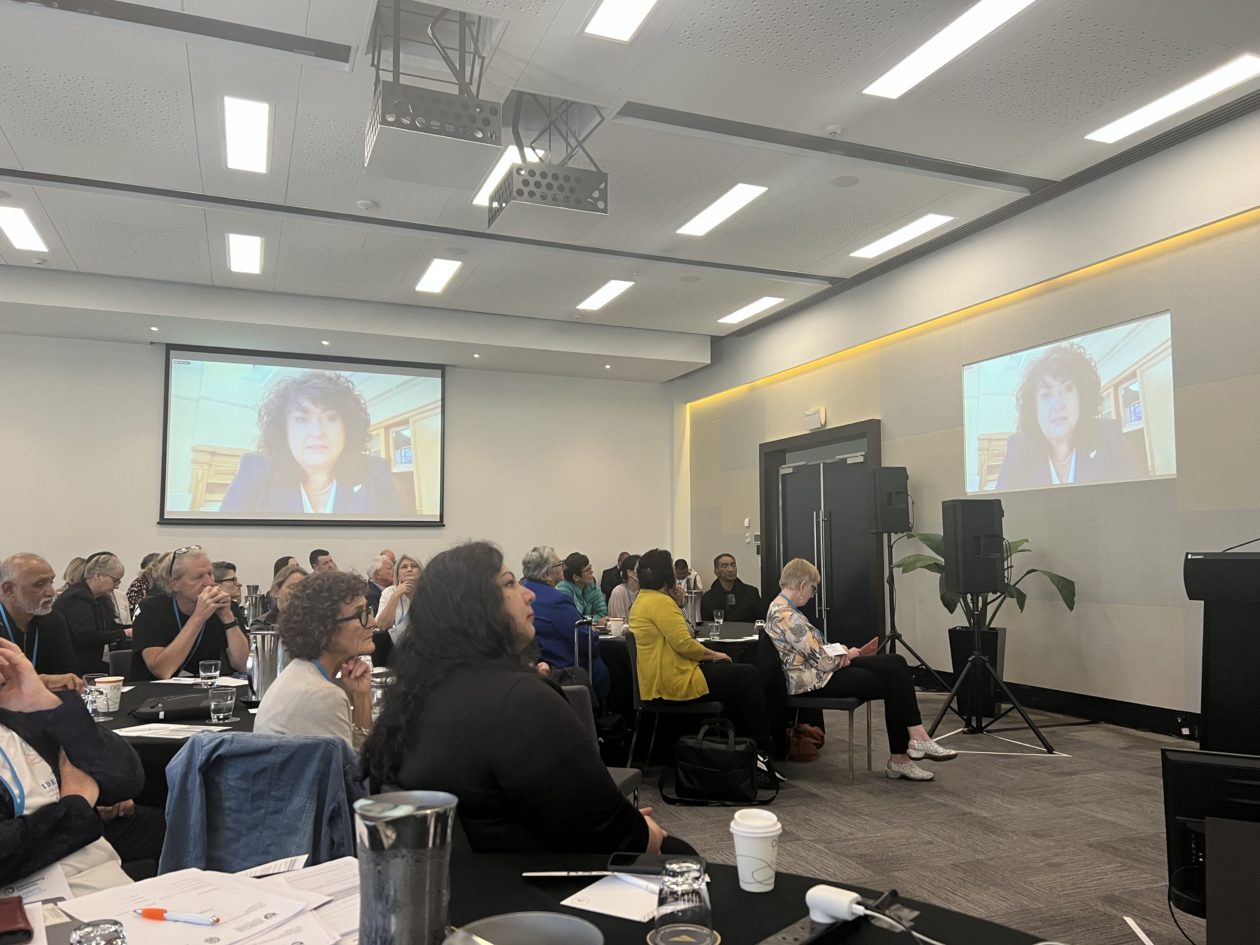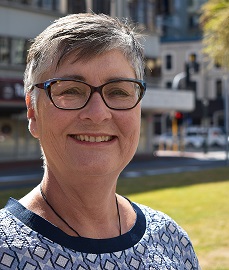Action plan blueprint for Government to combat crisis
Alzheimers NZ Chief Executive Catherine Hall highlighted why it’s crucial the Dementia Mate Wareware Action Plan is implemented by Government at the latest one-day event by Alzheimers NZ, Repositioning Dementia: Seeking solutions, in March.


This was quite a difficult speech to write. We have a new Government, a new Minister, Associate Minister of Health Hon Casey Costello, from whom we shall hear soon, and new relationships at Health NZ Te Whatu Ora.
So, in thinking about what I wanted to say today, I was struck by the fact that, to some extent, the dementia mate wareware sector is in limbo. We are not yet sure how our new Government, Minister and officials will respond to the dementia mate wareware challenge facing Aotearoa New Zealand, and we do have to give them a chance – and time – to properly understand why the need for Government action is so desperate. So, we can’t start building our relationship with our new Government by complaining!
At the same time, we need to continue to make the case as strongly and as robustly as possible that fully funding and implementing the Dementia Mate Wareware Action Plan will be life-changing for the many tens of thousands of New Zealanders living with dementia mate wareware now, their whānau and care partners – and will reduce the impact of dementia on the health system and on the economy now and in future! What a legacy for any Government!
But because it’s early days with a new Government, which we all know is focused on their political priorities, we do have to be slightly patient. For now, at least! So, with that background as context, Alzheimers NZ is starting to consider its new strategy. Our current strategy – the creation of a Dementia Friendly Aotearoa New Zealand – has been in place now for 10 years and we can point to some significant progress in that time.
Getting the Dementia Mate Wareware Action Plan to the point of endorsement by the last Cabinet alongside our partners is just one example of that, as is the Dementia Declaration, our Dementia Learning Centre, our Dementia Friendly Programmes, our information resources, and of course events like this one today.
But in starting to think about our new strategy, I have been reflecting on whether things have changed for people living with dementia over that time – whether there are more and better health services available – and it’s a pretty grim picture!
There have been several points over the past 10 years when successive Governments could have taken positive action to improve services – yet didn’t.
And each time that happened the lives of New Zealanders living with dementia mate wareware got harder. Life is much harder now than it was 10 years ago:
- It’s harder now to get a diagnosis.
- It’s harder to get useful personal care and home help that supports people to live independently at home.
- It’s harder to get community support from local Alzheimers and dementia mate wareware organisations.
- It’s harder to navigate through the increasingly fragmented and under-pressure health system.
- It’s harder for carers to get a break.
- And it’s harder to get residential care when it’s needed in many parts of the country.
That story of hardship is, unfortunately, very familiar to all of us who work in ‘the system’, but it’s largely hidden from the system itself. And that’s because the important data to support this all-too-familiar picture is not available or visible nationally – some because the data’s not held in national systems, some because it’s not actually collected.
As we all know, dementia mate wareware, alongside many other chronic and progressive conditions, has a significant impact on the person, and on the whānau and whānau care partner. And with its often-slow progression, the person living with dementia mate wareware, their whānau and the whānau care partner need increasing support over time.
Most people live at home and require support in the community and at home for most of their time – and that support to live independently is often more important on a daily basis for many people than clinical support.
And of course, there are also very limited services if you have dementia mate wareware and are Māori, Pacific or Asian, or have young onset, are living alone, are part of the rainbow community, and or are living with other conditions.
And that reality is very real challenge when it comes to working with our new Government and new officials. They don’t get to see the real-life impacts on our people that we see.
And that, in turn, means ‘the system’ is in danger of making decisions based on an incomplete picture that misjudges the size and scale of the problem, and misses entirely the human cost.
Here are some other examples of the lived experience which the system doesn’t capture:
- A person with dementia mate wareware who said ‘coming out’ as having dementia was a much harder journey that coming out as gay.
- A care partner who said they struggled hard to get help for their husband and when they finally got it, it made life even harder not easier!
- The care partner who gave up a job they enjoyed because caring for their loved one was so difficult.
We must also acknowledge another reality – that dementia mate wareware is treated differently to other conditions. For example, when it comes to cancer, the system doesn’t just focus on hospice care because they can count the number of beds.
And we face exactly that situation when it comes to Aotearoa New Zealand’s rapidly ageing population. The system isn’t really – even remotely – planning for it in any meaningful and joined-up way.
By 2034, more than one in five New Zealanders will be aged 65 years or over, approximately 1.2 million people. We know older people are the biggest users of the health system. We also know ageing is the most significant risk factor for dementia mate wareware.
In her recently released report Amplifying the voices of older people across Aotearoa New Zealand, the Aged Care Commissioner points out that Aotearoa New Zealand needs an integrated action plan for the health of older people. The report’s a healthy read, running to some 50-odd pages, but I do commend it to you all.
In that report, the Commissioner says that the integrated plan must include primary and community care, residential care and secondary care, and she says the system needs to better manage the transitions between these care categories.
She also says much better community care is needed, and that it is important to take opportunities to reduce the number of people living with dementia mate wareware through public health measures such as hearing aids.
We agree with and support that, and as many of you will know, the Dementia Mate Wareware Action just happens to provide a blueprint for Government to do much of this.
OK, let’s talk just briefly about who’s responsible for fixing the problems Aotearoa New Zealand faces with an ageing population in general and with the looming dementia mate wareware crisis in particular.
And just in case there’s any doubt in anyone’s mind what that crisis looks like, let me remind you that Aotearoa New Zealand can expect at least a 240 percent increase in dementia mate wareware cases in the next 30 years. And this is not a problem for the future, the problem is already here. Today.
Surely a negative health trend like that should garner some urgent attention from the system. Imagine if cancer, or stroke, or heart attack prevalence was set to jump by 240 percent – I feel certain a suitable policy and political response would be forthcoming promptly. So, who’s going to take that action when it comes to our crisis?
We all know the sector has worked very hard to do its bit – writing the Action Plan, doing the research, developing, and rolling out new programmes and tools (CST, Māori CST, the MANA tool, online support and education) and we’re going to hear about more on those things today. Now we are waiting for the health system to do its bit!
We all know dementia mate wareware is not the only priority in the health system, or for Government – but we have to start somewhere, and as a sector we want to have those discussions and see a pathway to a better future! The two changes we have seen so far are very welcome.
It’s great to have new providers and partners developing new ways to think about post-diagnostic care and respite, and we’re looking forward to the outcome of those seven pilots that were announced in Budget 2022.
And the Leadership and Advisory Group is providing essential advice to Ministers and officials as well as stewardship of the Action Plan. But these are only short-term responses to a growing and long-term problem.
And again, the Leadership and Advisory Group is another example of the sector taking responsibility and stepping up, gifting the time, experience and expertise of some of our leaders to the Group.
I hope the system respects that and values the Group’s efforts and service – and, importantly, acts on the Group’s advice! We can all do our bit to support the Group and contribute to the ongoing work of the sector.
I urge you all to engage with the Network, be active, meet with and write to your local MP to make sure the voice of the dementia mate wareware community continues to be heard. And participate in Health NZ/Te Whatu Ora’s Aged Care Review stage two design process if you get that chance.
One other thing to mention is the fact that Alzheimer’s Disease International recently released the 2024 Attitudes Towards Dementia global survey. The goal is to build the world’s largest survey on prevailing attitudes and stigma towards dementia mate wareware. Last time a survey like this was undertaken, the voice of Aotearoa New Zealand was one of the strongest represented. So do take 10 minutes out of your day to be part of this kaupapa!
It’ll be wonderful to have our voice come through strongly when the report is launched as part of World Alzheimers Month in September – which will also be our final Repositioning Dementia event! Let me close by quickly re-stating what you all know.
Implementing the Action Plan will enhance many, many thousands of lives and alleviate hardship and challenges for many, many thousands more, it will also the risk of thousands and thousands more Kiwis developing dementia mate wareware in future and reduce the impact of dementia on the health system and the economy.
The question is – what more does the sector need to do to convince the system that dementia mate wareware needs its attention, urgently? I know we are probably seen as one of many health sector NGOs all clamouring for attention, funding or policy changes, or all of the above.
What sets us apart though, is the inescapable fact that the increase in dementia mate wareware prevalence is not incremental – it is massive. Frighteningly so. And it’s here right now.
But we also know the worst of those impacts can be mitigated and we have a Plan to do so. I’m sure we’re all looking forward to hearing from the Minister and we very much hope she and her new Government colleagues take this opportunity to work with us to Seek Solutions. Because the dementia mate wareware challenge facing Aotearoa New Zealand is not going away.
Caption: Associate Minister of Health Hon Casey Costello addresses attendees at the latest Repositioning Dementia event in Auckland and online

